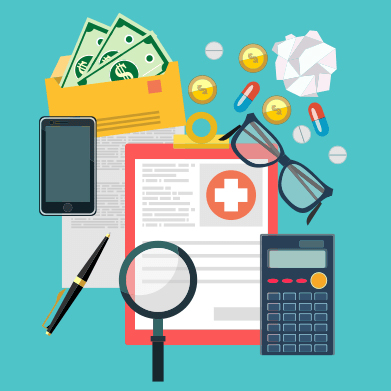Medical Loans: A Guide to Financing Your Health

Medical emergencies can be financially as well as physically and emotionally traumatic. The high expense of healthcare in the United States can leave even insured people with large bills. This is where medical loans come in, potentially providing a lifeline for unexpected or expensive medical bills.
What Are Medical Loans?
Medical loans are a type of personal loan specifically designed to cover medical expenses. Unlike secured loans such as home equity loans, they do not require any collateral for qualification. This makes medical loans more easily accessible, although it's worth noting that they may come with higher interest rates.
Medical loans can be used for a wide range of expenses. Here are a few examples:
- Hospital stays
- Surgery
- Emergency room visits
- Dental work
- Vision correction
- Cosmetic surgery
- Fertility treatments
- Mental health care
How Do Medical Loans Work?
Here's a breakdown of the typical medical loan process:
- Apply: You can apply for a medical loan online, through a bank, or through a credit union. Prepare to offer details about your income, expenses, and credit score.
- Get approved: Lenders will determine your loan eligibility, interest rate, and loan amount based on your creditworthiness.
- Receive funds: If approved, you will get the loan amount in a lump sum that you can use to cover your medical expenditures.
- Repay the loan: You'll make fixed monthly payments for a set period, usually two to seven years.
Pros and Cons of Medical Loans
Pros:
- Access to needed care: Medical loans can help you get the treatment you need without delay, even if you don't have the upfront cash.
- Predictable payments: Fixed monthly payments make budgeting easier.
- No collateral required: You don't have to risk losing your assets if you default on the loan.
- Potentially lower interest rates than credit cards: Depending on your creditworthiness, you may get a lower interest rate with a medical loan than with a credit card.
Cons:
- Debt burden: Adding even more debt to your financial picture can be stressful and impact your future financial goals.
- Interest costs: You'll end up paying more than the original amount borrowed due to interest.
- Risk of default: Missing payments can damage your credit score and lead to collection actions.
- Not all expenses covered: Some lenders may have restrictions on how you can use the loan funds.
How to Apply for a Medical Loan
Getting a medical loan may seem overwhelming, but with proper planning, the procedure can be streamlined and effective.
1. Assess your needs and options.
- Estimate the cost: Make sure to collect comprehensive quotes from your healthcare providers regarding all the medical expenses you anticipate. Also, take into account any possible extra costs such as medication, transportation and post treatment care.
- Explore alternatives: Before you consider taking out a loan, it's important to explore alternative options. Start by utilizing your emergency fund, discussing potential payment plans with service providers, looking into medical credit cards or even applying for government assistance programs such as Medicaid or Medicare Savings Programs.
2. Gather your documents.
- Proof of income: Pay stubs, W-2 forms, tax returns, bank statements – anything that verifies your income and ability to repay the loan.
- Proof of identity: Driver's license, passport, social security card.
- Medical bills or estimates: Documentation of the medical expenses you need to cover.
- Proof of insurance: Explanation of Benefits (EOB) statement or other documentation of your health insurance coverage.
3. Research and compare lenders.
- Online lenders: Platforms like LendingClub, Upstart, and Prosper offer quick pre-qualification and competitive rates.
- Banks and credit unions: Traditional institutions may offer lower rates depending on your existing relationship and credit score.
- Medical loan companies: Some companies specialize in financing healthcare expenses and may have flexible terms or partnerships with healthcare providers.
4. Pre-qualify to understand your rate and loan amount.
Many lenders provide online pre-qualification tools that estimate your interest rate and loan amount without affecting your credit score. This allows you to evaluate options and assess your financial situation.
5. Choose a lender and submit your application.
Gather all of your documentation and submit a formal application once you've decided on the best offer. Be truthful and open about your financial condition and medical bills.
6. Review and finalize the loan agreement.
Make sure to thoroughly go through the terms of the loan, which include the interest rate, how long you have to repay it, the monthly payments and any additional fees that may be associated with it. If anything is not clear, don't hesitate to ask questions before you sign anything.
7. Receive your funds and manage your payments.
After your loan gets approved, the funds will be transferred to your account, typically within a few business days. You can then utilize these funds to directly cover your medical expenses. To ensure that your credit score remains unaffected, it is recommended to set up automatic payments to help you avoid missing any payment deadlines.
Bonus tip: You might want to think about opening a separate savings account specifically for building an emergency fund to cover any potential medical expenses that may arise in the future. This approach can prevent you from having to depend on loans down the line.
Bottom Line
Medical loans can provide a helpful solution when it comes to handling unexpected medical costs. Yet, it's important to thoroughly evaluate the advantages and disadvantages, taking into account your financial capabilities before deciding on how much to borrow. Remember, there are other alternatives worth considering such as payment arrangements, medical credit cards and government support programs. By carefully assessing your financial circumstances and exploring all available choices, you'll be able to make a well informed choice about whether a medical loan is suitable for your needs.
